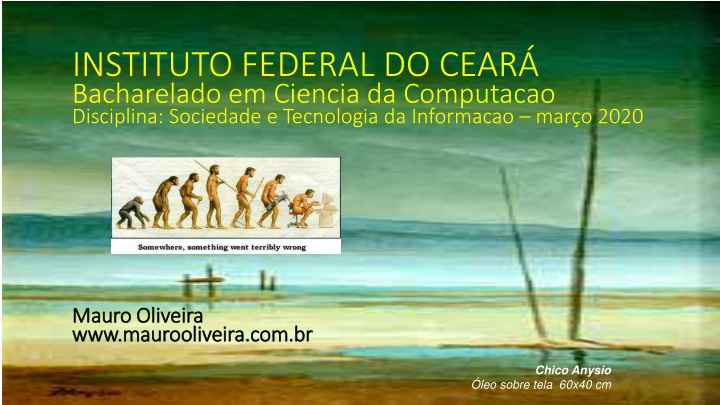Bacharelado em Ciencia da Computacao Disciplina: Sociedade e Tecnologia da Informacao
Mauro Oliveira's lecture at Instituto Federal do Ceara delves into the realms of computer science, artificial intelligence, and data science. It explores the origins, applications, and significance of these technologies, shedding light on their role in shaping society. The presentation covers fundamental concepts such as what a computer is, the advent of artificial intelligence, and the emergence of data science. It discusses the implications of AI in various fields, particularly in healthcare, and touches on the history and development of AI, tracing its roots back to Alan Turing's groundbreaking work. The lecture also delves into the mechanisms behind artificial intelligence, such as reasoning, machine learning, and communication techniques with humans. Overall, it provides a comprehensive overview of the interplay between technology, society, and information.
Download Presentation

Please find below an Image/Link to download the presentation.
The content on the website is provided AS IS for your information and personal use only. It may not be sold, licensed, or shared on other websites without obtaining consent from the author.If you encounter any issues during the download, it is possible that the publisher has removed the file from their server.
You are allowed to download the files provided on this website for personal or commercial use, subject to the condition that they are used lawfully. All files are the property of their respective owners.
The content on the website is provided AS IS for your information and personal use only. It may not be sold, licensed, or shared on other websites without obtaining consent from the author.
E N D
Presentation Transcript
INSTITUTO FEDERAL DO CEAR Bacharelado em Ciencia da Computacao Disciplina: Sociedade e Tecnologia da Informacao mar o 2020 Mauro Oliveira Mauro Oliveira www.maurooliveira.com.br www.maurooliveira.com.br Chico Anysio leo sobre tela 60x40 cm
Aula 12 Aula 12 Data Science em Sa de Data Science em Sa de 1. What Is a computer? 2. What is Artificial Intelligence? 3. What Is Data Science? 4. Applications of Data Science in Healthcare Chico Anysio leo sobre tela 60x40 cm
2. 2. What What Is Is Artificial Artificial Intelligence Intelligence? ?
2. What Is Artificial Intelligence? 1950 when British pioneer Alan Turing published Computing Machinery and Intelligence in which he asked, can machines think? AI is a subset of computer science that has origins in mathematics, logic, philosophy, psychology, cognitive science, and biology, among others
2. What Is Artificial Intelligence? The term AI was first coined in 1956 by Professor John McCarthy of Dartmouth College. Files Expert Systems Neural Network Fuzzy Logical Genetic Algorithms Machine Learning Data Science Professor McCarthy proposed a summer research project based on the idea that every aspect of learning or any other feature of intelligence can in principle be so precisely described that a machine can be made to simulate it . Databases
2. What Is Artificial Intelligence? Getting a system to reason rationally. Techniques include automated reasoning, proof planning, constraint solving, and case-based reasoning. Getting a program to learn, discover and predict. Techniques include machine learning, data mining (search), and scientific knowledge discovery. Getting a program to play games. Techniques include minimax search and alpha-beta pruning. Expert Systems Neural Network Fuzzy Logical Genetic Algorithms Machine Learning Data Science Getting a program to communicate with humans. Techniques include natural language processing (NLP). Getting a program to exhibit signs of life. Techniques include genetic algorithms. Enabling machines to navigate intelligently in the world This involves robotic techniques such as planning and vision.
2. What Is Artificial Intelligence? Four Distinctive Categories of Artificial Intelligence Reactive Machines Deep Blue, the chess-playing IBM supercomputer (It beat Kasparov en 1996). Limited Memory System that think and Act Rationally Theory of Mind Systems that think like human Self-Aware Artificial Intelligence Systems that are human Expert Systems Neural Network Fuzzy Logical Genetic Algorithms Machine Learning Data Science




